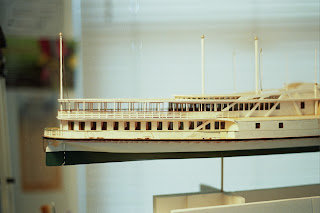Sidewheeler MARY POWELL docked at Rondour Creek, N.Y. c.1887
Collectible and rare, the MARY POWELL is one of the most prolific steamboat models to date. No other model has been sought after on a collector scale of northeastern vessels than that of the MARY POWELL. My history and experience with this subject has been time-tested to bring awareness to collectors and the shipmodel community that this particular steamboat is the gem of the Northeast and New York's Hudson River.
One of the most informative picture books published by Howell-North Books in
California during the 1970s, it detailed the history of this famous steamer.
Models of MARY POWELL had made their appearance in 1959 when Forrest Van Loon Ryder started building them. These models are in several notable collections today. There were other riverboat models that Van Loon built, but nothing so articulate as the MARY POWELL. It was thought that his version would be the only in existance, but it became apparent that a more thoroughly researched model would surface twenty years later.
My first encounter with the model began while studying at the Albany Institute of History and Art as a youth. As I developed my draftsman skills and advanced as a pencillist, I began studying blueprints from model kits I bought from money made as a paper carrier for the Albany Times Union. Those experiences, along with studying the clipper ship model at the local Boy's Club, guided me into the genre of the American steamboat...with my first model of MARY POWELL being built that September of 1980.
The 1980 model was commissioned by Albany International when the Albany Institute of History and Art declined selling the Van Loon Ryder version to the corporation. In fact, the model was chosen by New York's First Lady as part of the Governor's Mansion decor during their tenure. Soon thereafter, several models were built at my Knox Street studio. Then finally, 32 years later, a collector who was familiar with my steamboat line ( from media sources), negotiated a rare model of "the Queen". He wanted her researched and constructed as she first appeared in 1861.
Maritime artist and modelshipbuilder Rex Stewart at his New England studio
drafting the first-ever 1861 profile version of steamboat MARY POWELL.
To begin the process I needed a point of reference. Her varied dimensions were off by several feet; but overall, I was able to achieve accurate measurements by keeping them neutral. The point of reference that I applied for scaling the profile was the Andrew Fletcher blueprint of MARY POWELL's vertical beam engine. The profile was designed around the drawing which enabled me to acquire the correct scale. This, in part, coupled with the Endicott lithos and James Bard painting, helped to get an accurate rendition of the vessel's original appearance.
Bard painting of 1861 shows MARY POWELL as she originally appeared
on the river.
Profile plan at 3/32" = 1' scale of MARY POWELL c.1861 by author Rex Stewart
Shown in this photo is the hull and joiner work of the knees and strakes beneath
the guards. In this process the deck portion of the hull must be properly planed
for the superstructure to align properly.
Rear cabins are the most challenging part of the build. These must curve and bend
smoothly to align properly with the main deck so that the Saloon Deck (above) can
be flush for handling the Hurricane Deck. The rail detail would be the final application
around the cabins on these decks.
MARY POWELL shown at a further stage of build with stanchions, rails and
cabins in place. At 3/32" Scale, this is tedious work -and the stanchion posts,
though fragile, must be shaved to scale and strong enough to handle the next
deck without damage. To address this, basswood strips are carefully glued
between the spacing to serve as miniature beams.
MARY POWELL's bow was graceful and swan-like. Her double red pinstripes
on the hull beneath the guards were a unique feature that made her appearance
quite elegant to the river commuters of her day. No other Hudson River steamer
carried this -double pinstripes.
Further along in the build, shown are all the decks and the stern superstructure.
Cabins, stanchion posts, railings and spars all come together to bring about the
image that made MARY POWELL a legend...as well as an object of beauty.
The completed model showing MARY POWELL's amidship detail. This view
shows the meticulous superstructure of the Hudson River "Queen" from walking
beam down to her painted paddlewheels. The small donkey boiler behind the
paddlebox was a tedious application and a unique feature that placed the steam-
boat in a class of her own.
Steamboat MARY POWELL c.1861, 3/32' scale wood model - Rex Stewart
Hudson River steamboat MARY POWELL, the final completion. Based upon
the references of both James Bard painting and the Endicott prints, along with
writings of various authors and historians, this model is considered to be the
only model produced in the State of New York -showing her original appearance as "the Queen of the Hudson" when entering service in 1861.
I am thankful to The Lord for granting me this opportunity to be the first artist to
design her plans -and the first to construct her early appearance.
For more information concerning commissioned work for any and all Hudson River steamboats, email me at: Caseships@yahoo.com or call 1-774-757-7137 for details. These are museum quality fine models. One of a kind pieces that accurately define the vessel as it appeared at any given time in its career.
Also for the discerning collector, my works and credentials are found here at https://youtube.com/c/RexStewartoriginals and https://www.linkedin.com/in/rexstewart.
Thanks for viewing!




















